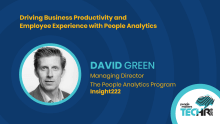People Matters Masterclass: The Roadmap of Success in People Analytics
People analytics is the bedrock of business and HR advancement, and HR ought to be in the perfect position for it. Collect data about the people in the organization and turn it into the kind of information that the business leaders want: it sounds so simple. Yet, many HR professionals are still grappling with the basics.
In this masterclass, Sola Osinoiki, Senior Director of People Technology at Naspers, will walk you through the basic strategy for getting your people analytics going. Here are some of the key takeaways from the session.
Have the right data: useful, reliable, and in demand
Your data must come in three dimensions:
-
Personal data about individuals
-
Structural data about how the organization is set up and where each individual is positioned in it
-
Function data about remuneration, learning, and other activities that help people do their jobs
Have the right processes to manage the data
Governance is central to the quality of data. You need to:
-
Keep the data accurate and up to date so that it is relevant
-
Archive and properly categorize it so that you can find it when you need it
-
Be sure of who owns it, so that there is someone responsible for keeping it accurate and up to date
-
Keep it secure
Have the right technology to enhance the data
The market for people analytics technology is huge. To make sure you have the right tools for what you want to achieve, follow these steps:
-
Break down each process into individual steps
-
At each step, see if there are ways of using technology to enhance it
-
Find the right tools that will help you achieve the improvements you want















